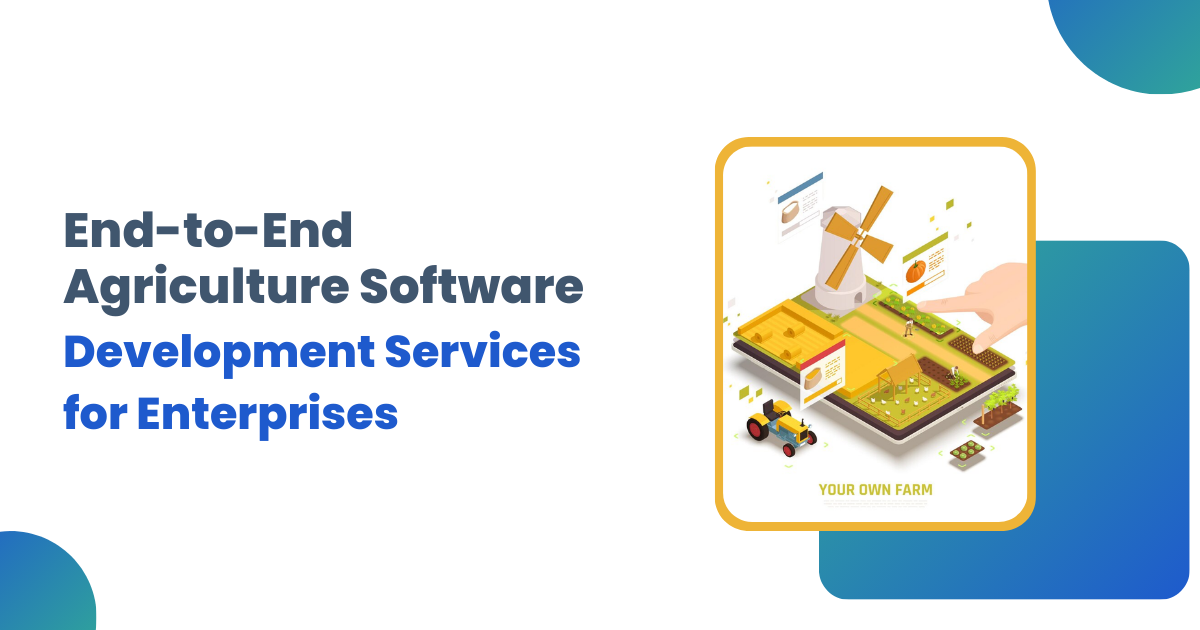
In recent years, the agriculture industry has experienced significant digital transformation, with technology playing a key role in modernizing farming operations. The growing need for precision, efficiency, and data-driven decision-making has led to the rise of specialized Agriculture Software Development Services. These services offer end-to-end solutions designed to address the unique challenges faced by enterprises in the agriculture sector.
From improving farm management to enhancing supply chain operations, Agriculture Software Development enables businesses to optimize operations, reduce costs, and increase productivity. In this article, we will explore the importance of Agriculture Software Development, the key features of end-to-end solutions, and how enterprises can benefit from adopting these services.
What is Agriculture Software Development?
Agriculture Software Development refers to the creation and customization of software applications specifically tailored to meet the needs of the agricultural industry. These applications are designed to address various aspects of farming, such as crop management, livestock monitoring, supply chain tracking, weather forecasting, and data analytics.
The goal of agriculture software is to help businesses in the agricultural sector optimize their operations, improve resource management, and make data-driven decisions. By utilizing advanced technology, agriculture software development enables farmers, agricultural producers, and supply chain managers to maximize efficiency, sustainability, and profitability.
Key Components of Agriculture Software Solutions
Agriculture software can be broken down into several core components, which can be customized based on the specific needs of a business. Some common features of agriculture software solutions include:
- Farm Management: Tools for managing planting, irrigation, harvesting, and crop rotation schedules.
- Livestock Management: Software for monitoring animal health, tracking breeding cycles, and managing feed and medication schedules.
- Supply Chain Management: Features that track product movement from farm to market, including logistics, inventory management, and order fulfillment.
- Data Analytics: Advanced analytics and machine learning algorithms that provide insights into crop yields, soil health, and market trends.
- Weather Forecasting: Integration with weather data to optimize irrigation, planting, and harvesting times.
- Mobile Access: Mobile applications that provide farmers with real-time data and insights on the go.
The Need for End-to-End Agriculture Software Development Services
Agriculture enterprises today face a range of challenges, including climate change, fluctuating market demands, resource management, and operational inefficiencies. These challenges make it essential for businesses to adopt modern technologies that provide comprehensive solutions across the entire agricultural value chain.
End-to-end Agriculture Software Development Services offer a complete, integrated system that covers all aspects of agricultural operations. From farm management to supply chain optimization, these services ensure seamless data flow and real-time insights, allowing businesses to make smarter, more informed decisions. The benefits of end-to-end solutions are particularly valuable for large enterprises operating in diverse agricultural sectors.
Key Benefits of End-to-End Agriculture Software Development Services
1. Improved Efficiency and Automation
One of the main advantages of agriculture software is the ability to automate many routine tasks. Farm management systems can automate scheduling, irrigation, and pest control, reducing the need for manual labor. By integrating systems for supply chain management, enterprises can automate inventory tracking, order processing, and shipping logistics.
For example, software that automates irrigation systems can use weather data to adjust watering schedules, ensuring that crops receive the optimal amount of water without overuse. Similarly, automation in livestock management can help track animal health, feeding schedules, and medication administration.
2. Better Decision-Making Through Data Insights
Agriculture software development services provide real-time data and analytics, allowing farmers to make data-driven decisions. For example, data on soil conditions, weather forecasts, crop health, and market trends can be used to adjust farming practices and optimize productivity.
Advanced analytics and machine learning algorithms can also help predict crop yields, identify potential disease outbreaks, and forecast market prices. These insights enable farmers to take proactive measures to prevent losses and increase profitability.
3. Enhanced Resource Management
Efficient resource management is crucial in agriculture, where costs for water, fertilizer, and labor can be significant. Agriculture software can optimize the use of resources by providing insights into water usage, fertilizer requirements, and labor needs.
For instance, by monitoring soil health and weather conditions, a software solution can recommend the precise amount of water or fertilizer needed for crops, minimizing waste and reducing costs. Similarly, livestock management software can track feed consumption, ensuring that animals receive the appropriate nutrition while reducing feed costs.
4. Streamlined Supply Chain Management
The agricultural supply chain is complex, involving various stages such as production, transportation, processing, and distribution. End-to-end agriculture software development solutions provide visibility across the entire supply chain, helping enterprises track products from the farm to the market.
For example, software solutions can monitor inventory levels, track shipments in real time, and ensure that products are delivered on time. This reduces the risk of spoilage and helps meet market demand. Additionally, agriculture software can help optimize routes for transportation, reducing fuel costs and improving overall efficiency.
5. Compliance and Sustainability
In the agriculture industry, there is increasing pressure to adhere to environmental regulations and sustainability practices. Agriculture software can assist businesses in tracking their environmental impact, including water usage, pesticide application, and carbon emissions.
By providing real-time data on environmental conditions and agricultural practices, businesses can ensure they comply with regulations and work towards sustainability goals. Software solutions can also help enterprises achieve certifications related to organic farming, fair trade, or sustainability, which can enhance brand reputation and attract environmentally conscious consumers.
Examples of Agriculture Software Solutions
1. Farm Management Software
Farm management software offers a centralized platform for managing all aspects of farming operations. It typically includes features like crop planning, task scheduling, irrigation management, and yield tracking. Some solutions also integrate with weather data to help farmers plan planting and harvesting times effectively.
Example: Ag Leader’s InCommand is a farm management solution that integrates with sensors and machinery to provide real-time data on crop health, weather conditions, and equipment performance. The software allows farmers to make informed decisions about planting, irrigation, and fertilization, improving crop yields and resource usage.
2. Livestock Management Software
Livestock management software helps farmers and ranchers monitor the health, breeding, and feeding schedules of their animals. It can track vaccinations, breeding cycles, and weight gains, ensuring the animals are healthy and productive.
Example: FarmWizard is a cloud-based livestock management solution that helps farmers manage breeding, animal health records, and feeding schedules. The platform offers mobile access, allowing farmers to track animals from anywhere and make quick adjustments to their management practices.
3. Supply Chain and Logistics Software
Efficient supply chain management is essential for ensuring that agricultural products reach the market in good condition and on time. Supply chain software helps monitor inventory levels, track shipments, and manage orders.
Example: IBM Food Trust is a blockchain-based solution designed to improve transparency and traceability in the agricultural supply chain. By using this software, businesses can track the journey of products from farm to consumer, ensuring quality control and improving customer trust.
4. Precision Agriculture Software
Precision agriculture software uses data from sensors, drones, and satellites to optimize farming practices. This includes monitoring soil health, managing irrigation systems, and detecting crop diseases early.
Example: John Deere’s Operations Center offers a comprehensive precision agriculture platform that integrates machine data, field mapping, and weather forecasts. This allows farmers to optimize field operations and increase efficiency.
How Enterprises Can Benefit from Agriculture Software Development Services
1. Customization to Fit Specific Needs
Agriculture Software Development Services offer customization, allowing enterprises to tailor software solutions to their unique requirements. Whether it’s integrating with existing systems or creating new features, custom software ensures that the solution addresses the specific challenges of the business.
2. Scalability and Growth
As businesses grow, their software solutions need to scale with them. End-to-end agriculture software solutions can be expanded to accommodate larger farms, more livestock, or extended supply chain operations. This scalability ensures that enterprises do not outgrow their systems.
3. Cost Reduction
By automating tasks, optimizing resource usage, and improving decision-making, agriculture software solutions can help businesses reduce costs. For example, automation can lower labor costs, while data-driven insights can optimize resource usage, leading to savings in water, fertilizer, and feed.
4. Competitive Advantage
With the insights gained from agriculture software, enterprises can gain a competitive edge in the marketplace. Real-time data on crop health, market trends, and supply chain logistics allows businesses to respond quickly to market demands and changes in the agricultural landscape.
Conclusion
End-to-end Agriculture Software Development Services offer comprehensive solutions for enterprises in the agricultural industry. By providing tools for efficient farm management, real-time data analytics, resource optimization, and supply chain management, these services help businesses increase productivity, reduce costs, and improve sustainability.
As the agriculture industry continues to face challenges such as climate change, resource scarcity, and increasing demand for food, adopting advanced technology through customized agriculture software development is essential. Businesses that invest in these solutions can gain a competitive advantage, enhance operational efficiency, and contribute to the future of sustainable agriculture.







